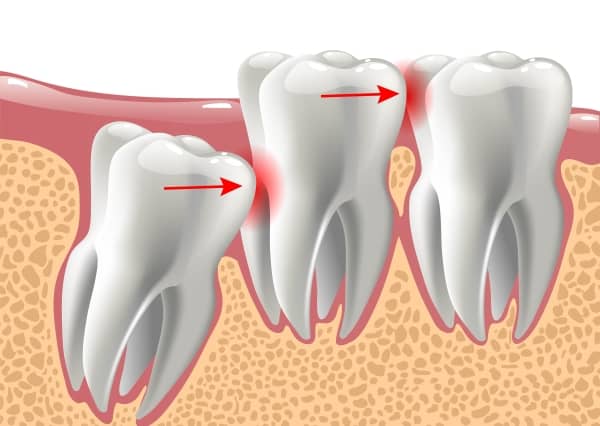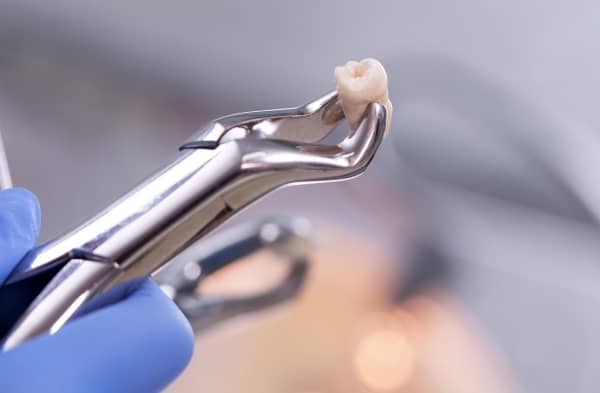
How Are Wisdom Teeth Removed?
Has your dentist recommended that you get your wisdom teeth extracted?
If so, you may be worried about possible pain and the recovery process after wisdom tooth extraction.
I’m here to help you understand exactly what to expect during wisdom tooth extraction, how to prepare to get your wisdom teeth out, and what to expect during the recovery process so you can feel at ease about your upcoming appointment.
Key Takeaways
- How Are Wisdom Teeth Removed? Numbing with local anesthesia, possible sedation, small incision to expose tooth, tooth removal in pieces, site cleaning, stitching, and gauze placement for bleeding control.
- Reasons for Removal: Impacted wisdom teeth can cause decay, pain, infection, damage to adjacent teeth, cysts, gum disease, jaw issues, bad breath, and trouble opening mouth.
- How Long Does Wisdom Teeth Removal Take? Approximately 20-30 minutes per tooth.
- Indicators for Extraction: Pain, partial gum flap covering erupted tooth, and fluid-filled cysts. Regular checkups are crucial for monitoring.
- Preparation Guidelines: Avoid smoking and alcohol before surgery, eat soft foods post-surgery, brush teeth, wear comfortable clothes, and arrange transportation.
- Anaesthesia and Sedation Options: Local anaesthesia and sedation methods to ensure comfort and pain-free procedure.
- Recovery Duration: Up to two weeks, with detailed post-operative instructions to minimise pain and infection risk.
- Post-Surgery Symptoms: Pain, sore throat, bleeding, swelling, discolouration, nausea, and vomiting.
- Aftercare Do’s and Don’ts: Rest, hydration, gauze management, dental hygiene, dietary restrictions, ice pack use, medication adherence, avoiding straws, smoking, and heavy activity.
- Emergency Contact: Seek dental advice for excessive swelling, fever, bleeding, or pain.
How Are Wisdom Teeth Removed?
Before wisdom tooth extraction, I make sure my patients are fully educated on what to expect before, during, and after the procedure. I believe knowledge is key to decreasing dental anxiety and helping you be at ease during the removal process.
The actual removal process will vary depending on your mouth, tooth placement, and how many wisdom teeth you need to be extracted. For most procedures, they can be completed right from a regular dental chair.
Here are the general steps of wisdom tooth removal:
- Your mouth and teeth will be numbed with local anaesthesia to keep you from feeling pain, although you might feel some pressure during the surgery (wisdom tooth removal typically takes up to 20-30 minutes per tooth, depending on the location and condition of the tooth and surrounding areas)
- Sedation may be used to put you at ease and prevent pain during the surgery (this will be thoroughly discussed before the procedure)
- Once your mouth is completely numbed, your dentist may use a small incision in the gum to expose the wisdom tooth
- If needed, the wisdom tooth will be taken out in several pieces
- Once the wisdom tooth is removed, your dentist will clean the extraction site and make sure it is clean and free of debris
- Your dentist may stitch up the extraction site to promote healing and faster recovery
- A gauze pad will be placed on the extraction site to control bleeding and encourage clotting
Why Might Removal Be Necessary?
Wisdom teeth can erupt without issue, but they often become impacted due to lack of space or jaw misalignment. Because of their location in the back of the mouth, wisdom teeth are more difficult to clean and at a higher risk of plaque and decay.
Impacted wisdom teeth can lead to a host of oral health issues, including:
- Decay
- Pain
- Infection
- Damage to adjacent teeth
- Cysts
- Gum disease
- Bleeding, irritated, tender, or swollen gums
- Jaw pain or swelling
- An unfavourable taste in the mouth or chronic bad breath
- Trouble opening the mouth
- Permanent damage to the jaw bone, nerves, and teeth
Because of the potential for complications, it is imperative to attend regular dental checkups so your dentist can monitor your wisdom teeth and recommend removal if necessary. This can save a great deal of pain and money in the long run.
When to Consider Removing Your Wisdom Teeth
If you are experiencing symptoms such as pain or discomfort from your wisdom teeth, your dentist will analyse X-rays of your mouth to see if you require wisdom tooth removal. Your dentist will also recommend wisdom teeth removal if there is a risk of infection, impaction, or overcrowding.
If you are experiencing one or more of the following wisdom tooth complications, you will likely require wisdom tooth extraction:
- Pain or discomfort from wisdom teeth
- A tooth that erupts but still has a partial gum flap covering it (this gum flap will trap food and put you at a high risk of infection and serious decay)
- Fluid-filled cysts
While not everyone needs to have their wisdom teeth extracted, it is an extremely common procedure.
There are many benefits of general dental checkups, including prompt action in the event of wisdom tooth complications.
If extraction is required, it is strongly recommended to have your wisdom teeth removed while you are young. With age, it becomes increasingly difficult to recover from any surgery, making it important to have your wisdom teeth removed right away if recommended by your dentist. Before age 25 is the best time to remove wisdom teeth.
Preparing for the Procedure: What to Expect Before Your Wisdom Teeth Removal
When you attend regular checkups, your dentist will monitor and evaluate your wisdom teeth closely. If removal is required, your dentist will advise you on exactly how to proceed.
After an initial consultation and evaluation, you’ll be given detailed pre and post-operative instructions.
Before your wisdom tooth extraction, your dentist will recommend general guidelines, such as:
- Avoiding smoking for a minimum of 8 hours before the surgery
- Stocking up on post-surgery foods that will be gentle on your mouth and teeth
- Avoiding alcohol consumption for at least 8 hours before surgery
- Brushing your teeth before surgery
- Wearing comfortable, loose-fitting clothing
- If required, lining up a friend or family member to drive you home following the surgery.
Anaesthesia and Sedation Options
If you are experiencing anxiety about the procedure, be sure to let your dentist know. Here at Genesis Dental, we go the extra mile to make sure you are comfortable through all procedures, including wisdom tooth removal.
From general checkups to tooth extractions, our team is dedicated to keeping you at ease, well-informed, and comfortable.
We also provide sedation dentistry. It is important to remind yourself that wisdom tooth extraction is an extremely common, straightforward procedure and that it is a quick process with minimal pain.
The affected area will be numbed with the proper local anaesthetic to ensure you are comfortable throughout the extraction process. We will choose the sedation method that will safely keep you pain-free and relaxed throughout the entire extraction process.
Our goal is to surprise you with how painless wisdom tooth removal can be! We’ll make sure you are completely numb and properly sedated so you do not feel a thing, aside from some occasional moderate pressure.
How Long is Wisdom Teeth Recovery?
It can take up to two weeks to recover fully from wisdom teeth removal.
After surgery, you will be given a detailed set of instructions to follow to keep your pain at a minimum, help you heal as fast as possible, and decrease your risk of infection. It is crucial to follow these recommendations closely to avoid complications.
Here is a general idea of what to expect after wisdom tooth extraction and possible side effects you may experience as you recover.
Pain
This common procedure does include some mild pain during the recovery process. Once the local anaesthetic wears off after the procedure, you will likely experience some pain and discomfort.
However, it is possible to keep pain to a minimum if you follow after-care instructions closely and take medication (according to your dentist’s recommendations) if needed.
We will make sure you are thoroughly educated on what to expect and how to keep your pain as low as possible as you recover. Your dentist will also recommend prescribed or over-the-counter medication to help minimise any pain after surgery.
Pain is usually highest two days after the extraction process. Pain should continue improving each day after day 2 post-surgery and be gone completely within two weeks of the surgery.
Sore Throat
Some patients may experience a slight sore throat or discomfort when swallowing. This typically only lasts for a couple of days following wisdom tooth extraction and occurs due to swelling.
Bleeding
Light bleeding is fairly common after wisdom tooth surgery. Your dentist will place gauze over the extraction site to help minimise bleeding.
Be sure to keep this gauze over the site for at least half an hour following the procedure. Your dentist will give you additional gauze pads to help minimise bleeding.
Bite down firmly but gently on the gauze pad over the extraction site to help minimise bleeding and promote clotting.
Swelling
You may notice some minor swelling of your mouth and face after the procedure. You can use cold compresses and ice packs for the first two or three days to help keep swelling to a minimum.
Discolouration
In the two to three days following surgery, you may notice greenish, yellowish, blueish, or black discolouration as a result of bruising to the facial tissue. Heat can help reduce discolouration and provide comfort as you heal.
Nausea and Vomiting
It is possible to have some nausea or vomiting following wisdom tooth extraction. If you are struggling with vomiting or nausea, it can be helpful to wait at least 30 minutes after surgery to try taking any of your prescribed medications or drinking water.
Post-Surgery Recommendations
Here are some of the do’s and don’ts for wisdom teeth aftercare:
- Get adequate rest
- Stay hydrated by drinking enough fluids
- Keep the gauze pad over the extraction site for no longer than at least 30 minutes
- Ask your dentist how soon after the procedure you can brush your teeth (generally you need to wait at least 24 hours)
- Avoid lying completely flat by using pillows to prop up your head
- Use care and caution when eating or drinking
- Use an ice pack or cold compress to minimise swelling and pain
- If prescribed by your dentist, take antibiotics as directed
- Take prescribed or over-the-counter medication if necessary and according to your dentist’s instructions
- Stick to clear liquids and soft foods such as mashed pumpkin or squash, yoghurt, mashed potatoes, cottage cheese, pureed foods, applesauce, steamed and mashed carrots, smoothies, mashed banana, ice cream, hummus, and mashed avocado. For a two week, dentist-approved meal plan, read our blog on what to eat after wisdom teeth removal.
- Use a dab of Vaseline around the corners of your mouth if there is cracking or dryness
- Ask your dentist if you should be rinsing the sockets with a saltwater mixture
- Stand up slowly to prevent dizziness
- Avoid the use of straws
- Avoid touching the area with your tongue or fingers
- Avoid operating heavy machinery or driving for at least 24 hours
- Avoid solid foods for at least two weeks, especially hard or crunchy foods such as nuts
- Avoid soft drinks, hot liquids, alcohol, and caffeinated drinks for at least 24 hours
- Use an ice pack bandage on the outside of your jaw/mouth as needed
- Avoid smoking, sauna use, and strenuous activity for at least 24 hours
Contact your dentist right away if you are dealing with excessive swelling, a high fever, exposed bone, intense tooth sensitivity, excessive bleeding, or intense pain.
Have Questions About Wisdom Tooth Extraction?
Has your dentist recommended wisdom tooth removal? Or do you have concerns about your wisdom teeth?
Contact our dentists in Canning Vale and we’ll gladly answer your questions and help you book an appointment. We’re here for all your oral health needs, including wisdom teeth care and removal.
Our entire team is highly skilled at delivering quality care in a comforting, reassuring manner. If you are nervous about wisdom tooth extraction, we can help you get through the procedure with minimal pain and anxiety.
Whether you are here for wisdom tooth removal, a root canal, or a filling, we keep you informed before, during, and after any procedure. We pride ourselves on delivering a dental experience that is comfortable and effective.






